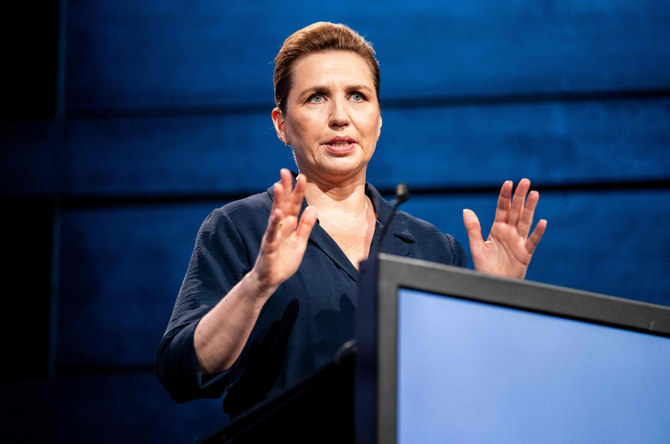COPENHAGEN: Danish authorities said Saturday that an attack on Prime Minister Mette Frederiksen, which she said left her “shaken” but “fine,” was not thought to be politically motivated.
A 39-year-old Polish man, apprehended after hitting the prime minister on Friday evening on a Copenhagen square, was remanded in custody until June 20 after appearing before a court in the Danish capital, prosecutor Taruh Sekeroglu told reporters.
“It is not our guiding... hypothesis that there is a political motive here. But that is something that the police of course will investigate,” Sekeroglu said.
Sekeroglu said the man was suspected of violence against a public servant and deemed a flight risk.
In a post on social media platform Instagram on Saturday evening, the head of government said she needed “peace and quiet.”
“I am saddened and shaken by the incident yesterday, but otherwise I am fine,” said Frederiksen, 46.
She thanked people for the “many, many, many messages of support and encouragement,” and said she now needed to be with her family.
Frederiksen’s office told AFP earlier that she had been taken to a hospital for a check-up after the attack which had caused a “minor whiplash injury.”
During the hearing on Saturday, the prosecution presented a statement from a doctor describing the defendant as mentally unbalanced and intoxicated, Danish media reported.
Broadcaster DR said police had described the man, who denied being guilty of a crime, as “probably both under the influence of substances and drunk” when arrested.
The broadcaster also reported that while in court the prosecutor asked if the man could remember what he was doing between 5:30 p.m. (1530 GMT) and 5:45 p.m. the day before.
“To be completely honest, then no, not much,” the man replied, according to DR.
French President Emmanuel Macron on Saturday joined European leaders in denouncing the attack, labelling it “unacceptable,” in a statement on X.
“I strongly condemn this act and wish Mette Frederiksen a speedy recovery,” Macron added.
Two witnesses, Marie Adrian and Anna Ravn, told newspaper BT they had seen Frederiksen arrive at the square while they were sitting at a nearby fountain, just before 6:00 p.m. on Friday.
The newspaper cited the women as saying that a man gave Frederiksen “a hard shove on the shoulder, causing her to fall to the side” but not hit the ground.
It said they described the man as tall and slim and said he had tried to hurry away but did not get far before being grabbed and pushed to the ground by men in suits.
The attack was widely condemned by leading European politicians, including EU Commission chief Ursula von der Leyen, who said it was a “despicable act which goes against everything we believe and fight for in Europe.”
Ordinary Danes on the streets of Copenhagen were shocked.
“I was just surprised that was something that could happen,” 45-year-old Anna Liljegren told AFP.
“I’m sure she has security,” she added.
Another Dane, 25-year-old Frederik Bey, told AFP he thought it was “quite disturbing that things like that can happen in Denmark.”
In 2019, Frederiksen became the country’s youngest prime minister at the age of 41 and kept the post after emerging victorious in the 2022 general election.
The incident follows a spate of attacks on European politicians from across the political spectrum ahead of this week’s EU elections.
Several politicians in Germany have been attacked at work or on the campaign trail.
On May 15, Slovak Prime Minister Robert Fico was shot four times at close range as he greeted supporters after a government meeting.
Fico, who survived the assassination attempt, underwent two lengthy hospital surgeries.
Danes head to the polls for their EU vote on Sunday.


























